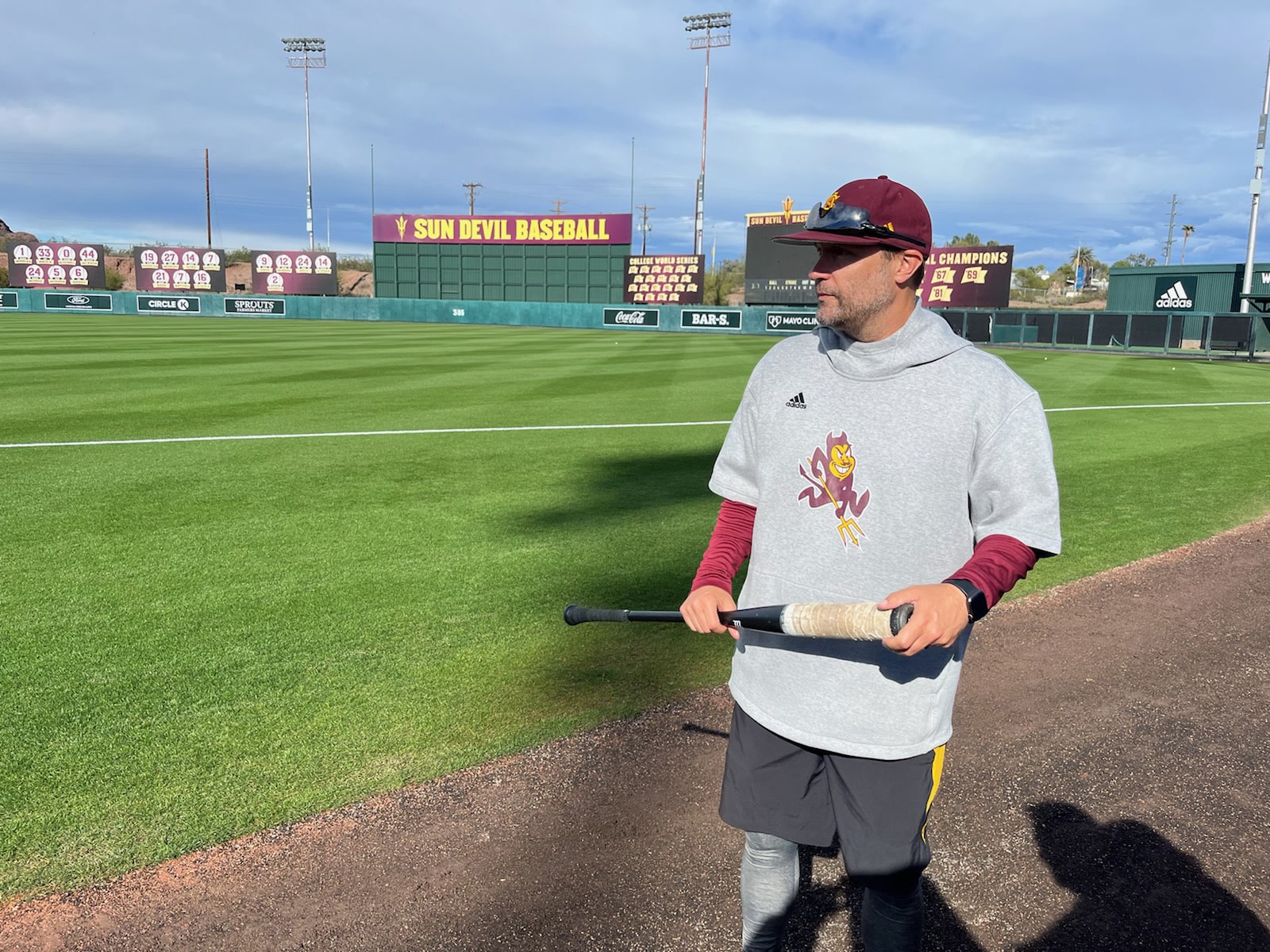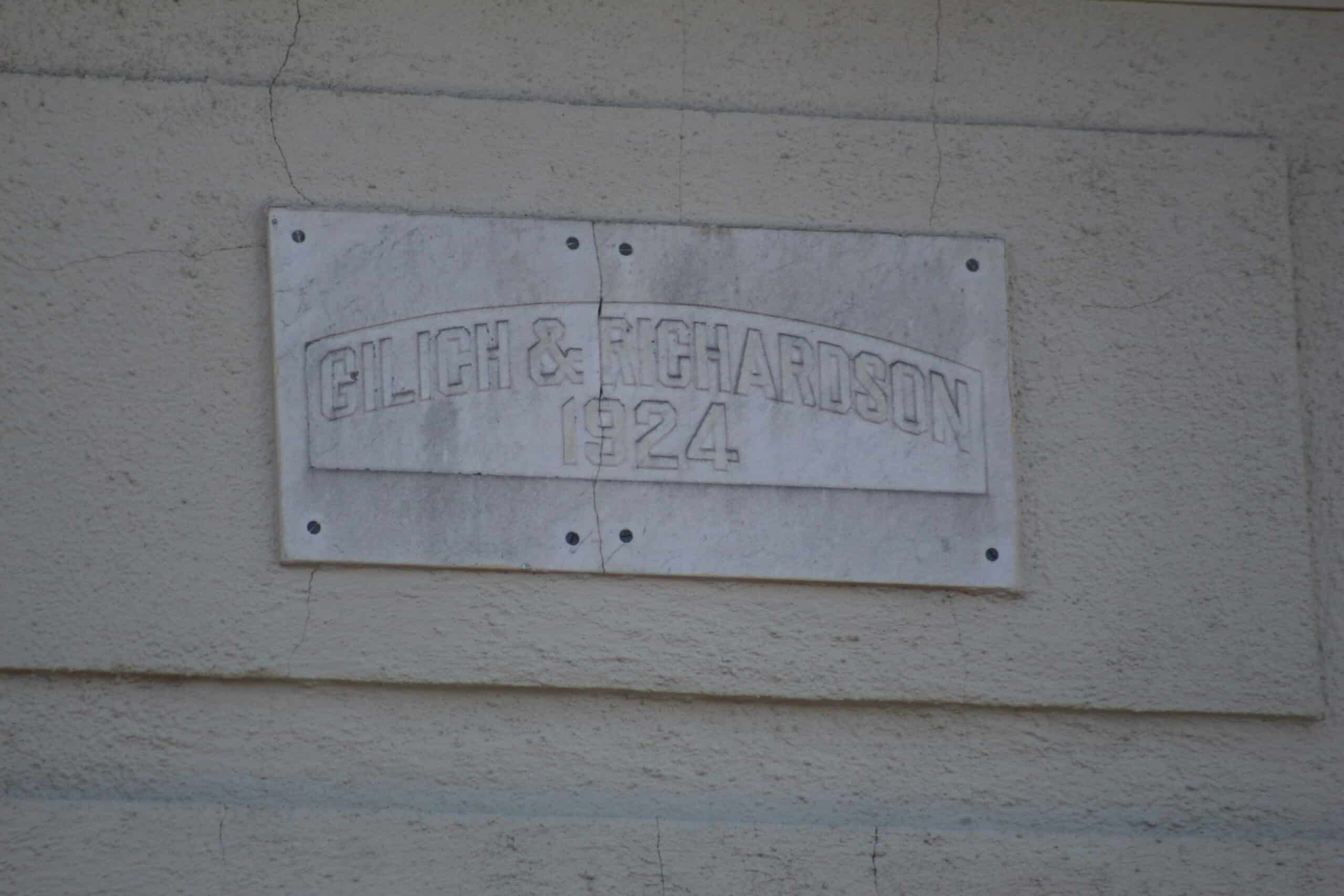Community Sports
Gig Harbor native Gilich an assistant at ASU after long climb up coaching ladder
Anthony Gilich can attest that profound life lessons can be learned on a baseball diamond.
For the Gig Harbor native, one life-altering lesson came while serving as junior varsity baseball coach at Ellensburg High School during his final semester of college. To graduate from Central Washington University with his degree in communications, it was a course requirement, he had to coach a team … somewhere.
“I fell in love with coaching,” said Gilich. “From there I had to figure out a way to make a living doing it.”
Mission accomplished. These days Gilich serves as a first-year assistant coach for the Arizona State Sun Devils, one of college baseball’s most-revered programs. Should Gilich need a reverential reminder, he can merely look at the outfield wall at Phoenix Municipal Stadium.
- Five national championships
- Twenty-two trips to the College World Series
- More Major League Baseball alumni than any other college program
“Yeah, Barry Bonds came by the other day,” Gilich says when asked about ASU’s historic baseball bloodline. “I’ve talked this year with Dustin Pedroia and Alvin Davis. There’s such a great tradition and aura about this program. It’s unmatched.”

Former Gig Harbor High baseball star Anthony Gilich at Phoenix Municipal Stadium, home of the Arizona State Sun Devils baseball team. Gilich is an assistant coach at ASU, working under former Mariner Willie Bloomquist. Photo by Leland Smith
Looking for an edge
Gilich was a fixture on the baseball diamond at Gig Harbor High School in the mid 1990s, capping his high school career by helping the Tides win the 1997 Class AA state championship, the first in school history. Other senior players on that squad included Matt Gardner, Tim Friedman, Aaron Arujo, Sam Baurichter, Donald Averill and Robert Iverson.
Playing shortstop, Tides head coach Pete Jansen recalls that Gilich brought a competitive fire that was unmatched.
“He was so smart on the baseball field. He was always looking for an edge,” said Jansen. “There aren’t many players like that.”
For instance?
In a tight spot, Jansen would often bring Gilich from shortstop to the pitcher’s mound to face one hitter and get a third out. The strategy allowed another hurler to get warm … and Gilich was nails.
His best pitch may have been his pickoff move to first base. Jansen recalls that Gilich often retired a side by picking off a baserunner, without throwing to the plate, then go back to play shortstop.
Issuing a walk to a baserunner
Story time.
“We were in this tight game at our place with Yelm. We got up 5-0, but late in the game, they’d scored a couple and had guys all over the bases. Anthony gets on the mound, throws over and nearly picks a guy off,” Jansen recalls. “From the third base box, I hear their coach yell, ‘If you get picked off, you’re walking home in front of the bus.’ So Anthony … he guns it back over to first and gets the guy.”
Jansen added that he never had the heart to ask the coach if he made that kid walk home in front of the bus.
Gilich’s best pitch on the mound?
“Strikes. I didn’t have great stuff, but I was competitive. I enjoyed doing whatever it took to have guys get themselves out. Coach Jansen had a real creative approach to practices and how he managed games. I’ve always tried to use that approach with coaching.”
From Gig Harbor High School, Gilich, 43, went on to play one season at Tacoma Community College, then another at Santa Barbara City College. Self-described as a quick, uber-competitive, utility player without a big bat, he suffered a horrible ankle and knee injury while at Santa Barbara. His quickness — that edge — was gone.
“The injury didn’t rob me of a pro career, but it held me back from a further college career.”
But Gilich’s drive to compete shifted into another gear. Naively, he thought he could parlay his Ellensburg High School JV experience into a college gig somewhere, then fast-track to a bigger school.
“I called (head coach) Ken Knutson at the U-dub and asked about a coaching spot. He said ‘No.’” Gilich recalled. “I told him I’d be willing to coach for free. He said … ‘No.’ I realized this just might be a little harder than I thought.”
Catching a break at UPS
Gilich caught a break when University of Puget Sound baseball coach Brian Billings said “Yes.” Combined with a club coaching stint with Tacoma-based Triple Play, Gilich climbed the coaching ladder landing at Central Arizona College, a national community college baseball powerhouse.
He was an assistant for the Vaqueros for seven seasons before starting a nine-year run as head coach in 2015, highlighted by National Junior College Athletic Association (NJCAA) national championships in 2022 and 2019. He was tabbed as Arizona Community College Athletic Conference (ACCAC) Coach of the Year four times. Also in 2022, he was named American Baseball Coaches Association (ABCA) National Coach of the Year.
His record of 395-132 (.749 winning percentage) is best all time at Central Arizona. During his tenure as head coach, MLB teams drafted 47 Vaqueros while 223 went on to play at four-year colleges.
Gilich holds high praise for Central Arizona.
“That is a really proud baseball program and a very special group of people. I feel very indebted to the people there.”
Working with Willie
Walking around Phoenix Municipal Stadium, ASU’s home field, one can’t escape the Sun Devils history and aura.The plaques of distinction for draftees and All-Americans is staggering.
We’re talking about the likes of Reggie Jackson, Sal Bando, Floyd Bannister, Bob Horner and many, many more. The list is mighty.
One prominent name is Willie Bloomquist, the former South Kitsap star who played 15 seasons in the Major Leagues with Seattle, Kansas City, Cincinnati and Arizona. Today, Bloomquist serves as the Sun Devils’ head coach.
So, how is it working with Willie?
“As a coach, he is what you saw as a player,” said Gilich. “He’s very competitive and he’s always looking for a way to beat you with that blue collar, hair-on-fire style. It’s fun to watch as he gets this program to where he wants it to be and that’s to mirror his personality. … It’s all underscored by hard work, being tough, and being the best at whatever we set out to be.”
While Bloomquist’s name packs a punch in local baseball circles, the Gilich name hasn’t fared badly either … on two fronts.
Boats and baseball
On the baseball front, older brother Denny Gilich was a hard-throwing, string-bean righthander who served as the ace of Peninsula’s pitching staff from 1990-93. Following stints at University of Portland and Long Beach State, Denny’s collegiate baseball ride was capped off by a monumental 1998 season at College of Idaho (then Albertson College).
The Coyotes rode Gilich’s arm to the National Association of Intercollegiate Athletics (NAIA) national championship. He was All-Conference with a 10-1 record, and 2.23 ERA, while averaging 12 strikeouts per game. Opponents hit a mere .185 that season while striking out 116 batters, second all-time at College of Idaho.
Denny Gilich was drafted twice by Major League Baseball clubs: following high school by the Colorado Rockies, then post-college by the Los Angeles Angels. After two seasons in the minor leagues, a shoulder injury stalled his professional career.
What’s brother Denny up to these days?
“He lives in Gig Harbor and works in tech,” says Anthony. Denny “starts talking about things and I have no idea what he’s talking about. He speaks a different language, but he’s really good at what he does.”
Hardball heritage
Further up the family tree, three Novak brothers (maternal great uncles of Anthony and Denny) were celebrated baseball players in the region early in the 1900s. Brothers Frank, Nick and Tony Novak (three of five Novak boys) were big, strong and skilled country hardball players.
According to newspaper accounts of the day, Frank was great, but Nick might have been little better. Nick Novak pitched professionally in the 1920s, eventually reaching the esteemed Pacific Coast League with the San Francisco Mission Belles (Reds) for the 1927-28 seasons.
Nick Novak died of tuberculosis in 1943 at age 41.
Baseball prowess runs deep in the Gilich ancestral waters, as does fishing. Anthony’s father, Dennis Sr., owned and operated St. Mary, a Gig Harbor-based commercial salmon fishing vessel built in Tacoma in 1918. Dennis Sr., who passed in 2019, learned the fishing life from his father John (“Buster”) who absorbed the trade from his father, Andrew. Anthony’s mother, Nikki, passed away in 2022.
Anthony admits that boats, nets and fishing wasn’t in the cards for himself or bigger-and-way-taller-brother Denny. Summertime was spent on the baseball diamond while Dad might be fishing in Alaska, or in the San Juan Islands.
“I really wish I’d spent more time on the boat with my dad, just sharing that time with him, and with what he loved to do,” said Gilich. “But for Denny and I … neither one of us really had that deep passion. We were always playing baseball.”

This sign, near the corner of Pioneer Way and Harborview Drive, is a testament to the Gilich family’s deep Gig Harbor roots. Photo by Leland Smith
An old Gig Harbor family
Still, the Gilich family roots grow deep throughout the Gig Harbor shoreline. The family name adorns the “Gilich and Richardson 1924” building at the heart of Gig Harbor at Pioneer Way and Harborview Drive. The dedication plaque is directly above the balcony above All Star Guitar.
The traditional family fishing dock is intact near the base of Dorotich Street, though not recognized by sign or city proclamation. Anthony says he and Brother Denny would one day like to see family name recognized on the dock.
But for the moment, coaching the Sun Devils takes priority along with his own family. Along with wife Alison and son Grady, 7, they make their home in the Phoenix area. Alison teaches preschool nearby, where Grady attends second grade.
From where he once stood on a high school diamond in Ellensburg, did Gilich ever envision one day coaching the sport in such hallowed ground?
“When I first got to Central Arizona, we went to an ASU practice. That was when they were in Tempe at Packard (Stadium),” said Gilich. “A coach there saw us and invited us down on the field and then showed us all around the place. They were really good hosts. I’ll always remember that. It wasn’t really a goal of mine at that time, but do remember thinking, ‘Man … wouldn’t it be cool to work here’.”
Note: Special thanks to Greg Spadoni and the Harbor History Museum for providing additional research for this story.
